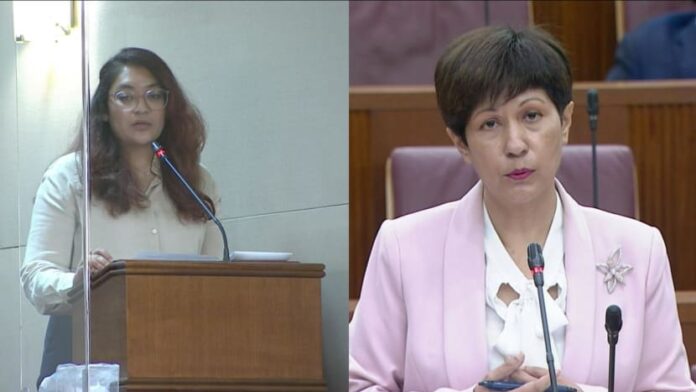Singapore: After Ms. Khan admitted to lying in Parliament on Monday (November 1), House of Representatives leader Indranee Rajah filed a complaint against MP Raeesah Khan (WP-Sengkang).
Ms. Khan admitted on Monday that she did not accompany the rape victim to the police station as she claimed in Parliament earlier in August, and that her previous statement on the matter was “untrue”.
She also apologized for accusing the police of mishandling the cases of sexual assault victims.
In a subsequent speech by Ms. Khan, Ms. Indranee stated that she “has no choice” but to lodge a complaint under Rule 100(7b) of the parliamentary rules of procedure, alleging violation of parliamentary privileges.
What is parliamentary privilege?
Parliamentary privilege means that members of parliament cannot be prosecuted or prosecuted for statements made in Parliament as part of their duties.
This allows members of Congress to speak freely on major issues without worrying about legal consequences. This exemption applies only to what is said and done in Parliament.
“As members of Congress, we are granted privileges. One of the privileges is the ability to enjoy immunity in Parliament. Unlike others, we can do this without worrying about being prosecuted, because the potential public policy interest is the ability to raise questions,” Ms. Indranee explained in Parliament.
“When we do this, we must be able to speak the truth in the House of Representatives, and it is very important when we assert or raise charges to support them.”
She said that members of Congress are “subject to duties and responsibilities,” adding that they should not violate or “abuse” this privilege.
“But as the Speaker of the House of Representatives, I also have the responsibility to ensure that all members of Congress in this Chamber perform their duties faithfully, responsibly and responsibly, and that any violation of privileges must be dealt with,” she added.
The parliament is a platform for people “to pay attention”. When there are false words, it “undermines trust”, said Ms. Indranee, who is also the second minister of the Ministry of Finance and the Ministry of National Development.
What do regular commands mean?
The Rules of Procedure cited by Ms. Indranee allow any member of Parliament to stand up at any time during a meeting of Parliament to complain, alleging that sudden privileges have been violated.
If the speaker is convinced that the complained issue ostensibly-or based on the first impression-affects the prerogatives of the parliament and has been raised as soon as possible, the issue will undoubtedly be referred to the Privilege Committee.
Until the committee reports its findings, no further procedures can be taken on the matter.
The committee consists of eight members. As members of the committee, Ms. Indranee stated that she and Mr. Shanmugam will avoid cases involving Ms. Khan.
Other members of the committee include: Speaker Chen Chuanren, Minister of Sustainable Development and Environment Fu Ying, Minister of National Development Lee Desmond, Minister of Social and Family Development Masagos Zulkifli, and other members of Congress Don Wee (PAP) -Chua Chu Kang) and Dennis Tan (WP-Hougang).
Article 20 of the Parliament (Privileges, Immunities and Powers) Act provides for the power of Parliament to take action against members who engage in “disgraceful conduct, abuse of privilege or contempt”.
According to the decree, Congress can imprison members of Congress for a term not exceeding the current session of Congress, imposing a fine of not more than SGD 50,000, or suspending members of parliament from serving for the remainder of the session or any part of the session.
Parliament can also instruct members to be reprimanded or cautioned by the speaker.
Previous events
The last time a member of Congress was referred to the Privilege Committee was in 1986.
The then Congressman J B Jeyaretnam (WP-Anson) was accused of abusing parliamentary privileges and accusing the executive branch of intervening in the judiciary with no basis.
He was also accused of “defaming the judiciary by implying that the judiciary did not perform its duties in accordance with their oath of office.”
The complaint was filed by the then Speaker of the House of Representatives, S Dhanabalan, who was then the Minister of Foreign Affairs.
Mr. Jeyaretnam was found guilty of abuse of parliamentary privilege by the committee and was fined S$1,000. The report was submitted to Parliament in January 1987.
As a member of Parliament, he was referred to the committee twice in 1986 to deal with different issues.
The latest report of the Privilege Committee was in November 1996. The then Minister of Health George Yeo filed a complaint with representatives of the Singapore Democratic Party (SDP), namely Dr. Chee Soon Juan, Mr. S Kunalen, Mr. Wong Hong Toy and Mr. Guan Yueqing.
Mr. Yeo claimed that the four SDP representatives contempt the parliament by fabricating data and providing false or untrue documents in order to deceive the committee.
In July 1996, the four men, representing the Social Democratic Party, provided oral evidence in support of their written statement before a special committee to verify medical subsidies for government polyclinics and public hospitals.
Due to “so-called errors” in the charts they submitted, they were summoned to the Privilege Committee to testify in August.
The committee finally determined that Dr. Chee was “the culprit so far,” and he prepared written comments and diagrams.
The committee reported that he fabricated data, gave false testimony, and deliberately provided false answers to cover up the fabricated behavior, among other allegations.
The four were fined. Dr. Chee was fined S$25,000, Mr. Wong was fined S$13,000, Mr. S Kunalen was fined S$8,000, and Mr. Kwan was fined S$5,000.






